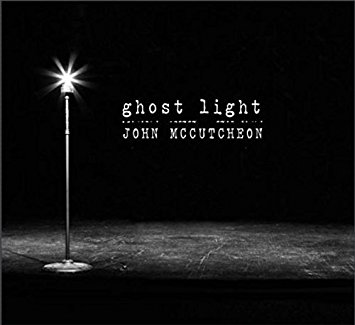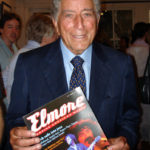Artist: John McCutcheon
Album: Ghost Light
Label: Appalsongs
Release Date: 2.9.2018

Folk and children’s-music singer John McCutcheon has been making albums for 45 years, but this, his 39th, came about rather accidentally. As often happens with a skilled songwriter, an image or a set of words will stick, almost crying out for song. McCutcheon explains, “I sat down over Memorial Day weekend and suddenly a line pestered me. ‘Billy didn’t come home last night.’ I thought ‘Okay, so who’s Billy? Where’s home? What happened to him?’ And it was off the races. Twenty-five days and 30 new songs later, what was I supposed to do?”
So, in the tradition of some of the best storytellers, and McCutcheon, wth his deep voice, regales us with the tale of a young man who didn’t come home, an old man facing the future in a bank, a dancing baby, a small town celebrating a local hero, and several other devastating songs. McCutcheon is well known as a multi-instrumentalist, but here he is focused on the songs, playing mostly guitar with one turn on hammered dulcimer and another on banjo. He brings in guests like fiddler Stuart Duncan, electric guitarist Pete Kennedy, pianist Jon Carroll and vocalists Kathy Mattea and Tim O’Brien to perform amidst pristine production and the songwriting which runs the gamut from simple to sturdy and provocative.
For much of McCutcheon’s career, his sound echoes Appalachian roots, and although there are plenty of those hints here, he uses several musical backdrops, including some where it’s simply his voice and Carroll’s piano. No matter the setting, the stories come through vividly. There are two clear references to Woody Guthrie. In fact, “When My Fight Is Over” is a co-pen with Woody—McCutcheon unearthed the lyrics from Guthrie’s archives back in 2005 and set them to music. “The Machine,” the album’s most powerful track, was inspired by the demonstrations of August 12, 2017 in Charlottesville, VA, told through the eyes of a WW II veteran. McCutcheon lived there for 20 years and raised his children there. The title is taken from that famous photo of the sign above Guthrie’s guitar, “This machine kills Fascists,” and that thought informs the chorus.
Like the best novels, his stories paint vivid character portraits, dwell on the details of common images that we often just take for granted, and make us think about history in a new light, whether it’s about the Bible, past wars and atrocities, or even the loss of local stores and local farms. Oh yes, all the questions about Billy can be found in “Dark Side of This Town” but no answers. That’s life in McCutcheon’s view: from the innocence of a baby dancing to dark, unsolved mysteries. Keep listening, there are enough observations here for two or three albums.
—Jim Hynes







Be the first to comment!